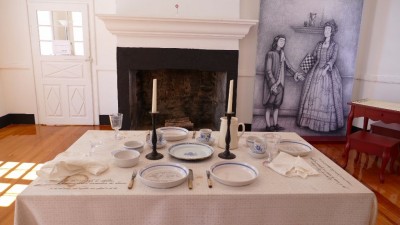At Home in the 1700s
While in Trois-Rivières, we visited the home of Pierre Boucher‘s grandson Joseph-Claude Boucher de Niverville, who married Marie-Josephte Chastelain in 1757 when he was 42 and she was 20. Marie-Josephte had inherited this home from her family.

Joseph Boucher de Niverville was a military man. Like his grandfather, he defended the city of Trois-Rivières. Joseph’s military career lasted for many years. He participated in many important expeditions which took him to the eastern, southern, and western limits of New France’s vast territory, which at the time covered most of the land in North America east of the Mississippi River.

The museum in the home of Joseph-Claude Boucher de Niverville illustrates home life in New France in the 1700s.
Favorite foods in New France in the 1700s included chocolate, which they ate for breakfast with milk and maple sugar. Residents ate moose, which they likened to beef, bear which tasted like pork, porcupine which tasted like suckling pig, and beaver which was like mutton. The people of New France also enjoyed wild strawberries.

On a Sunday in 1749, a Swedish scientist visited Trois-Rivières. He described the meal this way:
When we arrived in Trois-Rivières, the Governor was waiting for us with his people . . . . We finally sat down for dinner at dusk, at around 7 in the evening. But it was worth the wait! I will never forget that meal. The Governor said it was an extraordinary meal for an extraordinary guest, who traveled all the way from Sweden to get acquainted with our way of life. In any case, I can’t remember having eaten so much, nor having seen with my own eyes such a lavish meal . . . We were served about twenty courses . . .
We started with a fine vegetable soup served with bread as usual. After that, we had roasted goose, and nicely boiled partridges with herbs that make the whole room smell nice. Then came the beef stew, and pies with sauce, with the most delicious green peas puree I had ever tasted. Then, even if I had my fill, we were served a large mixed salad containing delightful cream cucumbers without a single seed in them. When we got to the dessert, they cleared the table before laying out all sorts of jams . . . strawberry, raspberry, cranberry, blueberry, gooseberry . . . I could not taste them all because I had quite enough.
At the end, the Governor served us coffee. I had never tasted this beverage, but I enjoyed it, with lots of sugar.
Joseph-Claude and Marie-Josephte had eleven children. The French government encouraged large families and gave incentives for people to have children. Families with at least ten living children received 300 pounds. Families with at least twelve children received 500. In addition, the king granted twenty pounds to boys who married before they were twenty and twenty pounds to girls who married before age sixteen.
Girls kept hope chests, which contained bedsheets, bedspreads, tablecloths, and towels to be used in their future homes. When explorer and botanist Pehr Kalm came to Canada in the 1700s, he noticed that Canadian girls always had a love song on their lips.
The legal age to be married was sixteen for boys and fourteen for girls. In 1655 a girl named Marguerite Sedilot had her marriage annulled and then reinstated. This was necessary because she had been only eleven and a half years old when she married.
In one museum display, I saw this old description of a perfect wife:
“If she fears God, if she’s well behaved and able to look after the household; above all, if she is able to properly raise her children and educate them in the Christian faith.”
That sounds similar to the instructions God gave in Titus 2.
Older women likewise are to be reverent in their behavior,
not malicious gossips nor enslaved to much wine, teaching what is good,
so that they may encourage the young women
to love their husbands, to love their children,
to be sensible, pure, workers at home,
kind, being subject to their own husbands,
so that the word of God will not be dishonored.
Titus 2:3-5


Thank you! This was such a delightful read. Although, I will likely have for some time the persistent mental image of a laden dinner table with a roasted porcupine gracing the snowy cloth, complete with a shiny red apple in its mouth. Them’s good eats!